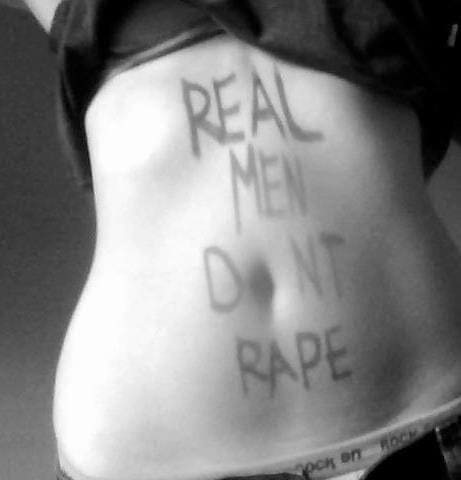
You have the power, with other men, to put a stop to rape and other kinds of men’s violence against women.
1. Check yourself. Examine your own attitudes and actions. Some of the ways you act or the things you believe, whether you know it or not, may actually support rape. Some examples of these are:
With women you see in public:
- Staring at, taunting or whistling at women when you’re standing around with other men
- Following women around
- Embarrassing women in public with put downs, name-calling, sexist jokes, comments on their looks or bodies, mocking, or otherwise ridiculing
With women you know personally, whether casual or intimate:
- Controlling a woman you know-a classmate, friend, or girlfriend–by using threatening gestures, using a loud voice/monopolizing the conversation, blocking doorways, or driving recklessly
- Criticizing or trivializing what a woman says or belittling, even in fun, her attitudes or thinking
- Pressuring a woman to have sex
2.Check your men friends: confront their attitudes and actions when they do any of the above.
3. Learn about yourself. Watch documentaries and read articles, essays, and books about masculinity, gender inequality, and the root causes of sexual violence. Educate yourself and others about the connections between larger social forces and the conflicts between men and women. Some resources are:
Books:
- Timothy Beneke, Men on Rape, St Martin’s, 1982.
- Timothy Beneke, Proving Manhood, University of California Press, 1997.
- Michael Kimmel, Manhood in America: a Cultural History, Free Press, 1996.
- Paul Kivel, Men’s Work, Ballantine, 1992
- Michael Messner and Donald Sabo, Sex, Violence and Power in Sports: Rethinking Maculinity, Crossing Press, 1994.
Some websites run by men taking a stand against sexism include:
- Men Can Stop Rape, a strong political organizing group of men in Washington, D.C.
- The Ally Program at Western Washington State run by male students.
4. Don’t put your money into anything that, subtly or in the open, supports violence against women. That means boycotting magazines, videos, music, comics, websites, radio and television that portray women in a sexually degrading or violent manner. Notice that these portrayals actually also put down and delimit men’s sexuality-or make it invisible. Tell your friends. And make noise about it: tell the people who produce these products to cut it out.
5. Support and fight for increased funding for battered women’s shelters, rape crisis centers and campus resources for women-and women’s sports.
6. Organize or join a group of men in school, at your workplace or among friends to work to end sexual assault and other forms of violence against women. A great place to organize is among existing men’s groups, in athletics, fraternities and elsewhere.
7. Volunteer in public schools, youth outreach and childcare centers and other organizations. These are places where, often, women are doing the work. They could use your help, and young people could use your presence.
8. Listen to women. No sexual assault survivor is ever at fault; no one wants or asks to be assaulted. Avoid blaming the victim.
9. Support women’s leadership and gender equity.
For more articles that will help you to fight this heinous crime visit RAPE: Rise Against Punishable Eccentricity.

You forgot just one thing in this fantastic article…using bloody common sense. Empathize. Why would you even think about degrading someone when you for a fact that had you been in their shoes you couldn’t handle it and as much as I hate to write this had someone done the same to a family member you wouldn’t stand by it. How about just empathizing with a fellow human being. There is a reason we’re at the top of the food chain, we’re supposedly smarter then animals. Prove it.
Wonderful!!